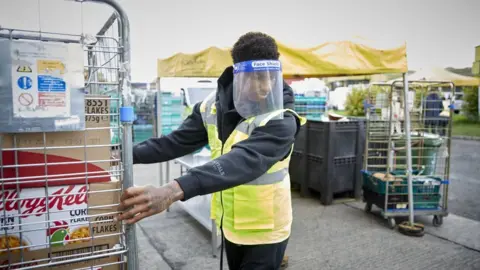Row over half term free school meals plan
 Reuters
ReutersThe government has defended its scheme to offer free food to struggling families in England over half term - after criticism from teachers' unions and council leaders.
Food will be provided for children by councils under the Covid Winter Grant Scheme, rather than through schools.
But councils say the government should provide food vouchers over half term.
"Vulnerable families will continue to receive meals," said a Department for Education (DFE) spokeswoman.
"Our guidance is clear: schools provide free school meals for eligible pupils during term time.
"Beyond that, there is wider government support in place to support families and children via the billions of pounds in welfare support we've made available," said the DFE spokeswoman.
Food parcels
But the Local Government Association (LGA), representing councils, said "the government should provide food vouchers to eligible families during February half-term as it did last summer" - and that the £170m Covid Winter Grant Scheme should be used for other support.
"During the last full national lockdown, government recognised the significant extra pressures on low income families and extended free school meal provision into the school holidays," said Richard Watts, chairman of the LGA's resources board.
"Government was explicit that the Covid Winter Grant Scheme was not intended to replicate or replace free school meals, but was to enable councils to support low income households, particularly those at risk of food poverty as we moved towards economic recovery."
The row follows the DFE's publication of guidelines on free meals, after an outcry over pictures of food packages to replace free school meals during the lockdown.
The prime minister and other ministers criticised the quality of what was being sent out by some school food firms.
 PA Media
PA MediaThe DfE guidance says: "Schools do not need to provide lunch parcels or vouchers during the February half term.
"There is wider government support in place to support families and children outside of term-time through the Covid Winter Grant Scheme."
The DFE insists that even though schools will not provide food parcels or vouchers during half term, children will still be supplied with food through the Covid Winter Grant Scheme.
This aims to support those most in need with the cost of food, energy, water bills and other essentials.
Councils are required to work out their own local approach to eligibility, using benefits data and their local knowledge to decide how to support vulnerable families.
Moving to this scheme for a replacement for school meals during half term, with the added pressure of a lockdown, has drawn criticism from head teachers and teachers.
Kevin Courtney, joint general secretary of the National Education Union, warned that switching schemes meant "yet more disruption to free schools meals could lie ahead in half term".

He said using this scheme could cause an "unnecessary logistical nightmare", suggesting continuing with providing meals through schools would be more simple.
Mr Courtney said: "This week, Matt Hancock, Gavin Williamson and Boris Johnson made public statements about how appalled they were by the quality of food parcels shared on Twitter," said Mr Courtney.
But he said ministers should now "hang their heads in shame" for threatening more "chaos and confusion" over providing food.
"These are battles which should not have to be repeatedly fought," said Mr Courtney.
'Badly thought out'
National Association of Head Teachers general secretary Paul Whiteman accused the the government of "badly thought out and last-minute schemes to help with holiday hunger" which he said were "leaving families and children anxious".
"The government must urgently clarify for families how they will be helped during the upcoming half term holiday so they can be assured that they will not go hungry," said Mr Whiteman.
Labour's Tulip Siddiq, shadow minister for children and early years, said: "Time and time again this government has had to be shamed into providing food for hungry children over school holidays."
Food charities and anti-poverty campaigners, including footballer Marcus Rashford, have repeatedly clashed with the government over the issue of food for poor pupils during the Covid-19 pandemic, particularly over school holidays.
The footballer forced the government to back down in the summer over its plans not to offer free meals in the holidays to poor pupils, whose families were likely to be suffering with reduced incomes.
But over the October half-term when the provision was withdrawn many local authorities continued to offer them from their own budgets.
